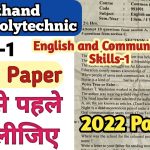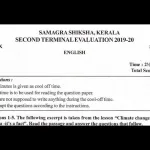IES Syllabus Overview (2025)
The IES exam comprises six papers, totaling 1000 marks, followed by a 200-mark Personality Test. The papers are:
-
General English – 100 marks
-
General Studies – 100 marks
-
General Economics I – 200 marks
-
General Economics II – 200 marks
-
General Economics III – 200 marks
-
Indian Economics – 200 marks
Detailed Paper-wise Breakdown
1. General English (100 Marks)
-
Objective: Assess candidates’ command over the English language.
-
Components:
-
Essay writing
-
Precis writing
-
Comprehension passages
-
Grammar and sentence correction
-
2. General Studies (100 Marks)
-
Objective: Evaluate general awareness and understanding of current events.
-
Topics:
-
Indian Polity and Constitution
-
History of India and National Movement
-
Geography of India and the World
-
Current Affairs (National & International)
-
General Science and Environmental Issues
-
Indian Economy and Planning
-
3. General Economics I (200 Marks)
-
Objective: Test understanding of microeconomic principles.
-
Topics:
-
Theory of Consumer Demand
-
Theory of Production and Cost
-
Market Structures and Price Determination
-
General Equilibrium and Welfare Economics
-
Mathematical Methods in Economics
-
Statistics for Economics
-
4. General Economics II (200 Marks)
-
Objective: Assess knowledge of macroeconomic concepts.
-
Topics:
-
National Income and Social Accounting
-
Theory of Employment, Output, and Inflation
-
Public Finance: Taxation, Budgeting, and Fiscal Policy
-
International Trade and Balance of Payments
-
Money, Banking, and Financial Markets
-
5. General Economics III (200 Marks)
-
Objective: Evaluate understanding of specialized economic areas.
-
Topics:
-
Economic Development and Growth
-
Environmental Economics
-
Industrial Economics
-
State, Market, and Planning
-
Global Institutions and Development Issues
-
6. Indian Economics (200 Marks)
-
Objective: Test knowledge of the Indian economy’s structure and policies.
-
Topics:
-
Indian Economy in Pre- and Post-Independence Periods
-
Development Strategies and Economic Planning
-
Poverty, Unemployment, and Human Development
-
Agriculture, Industry, and Services Sectors
-
Economic Reforms and Liberalization
-
Public Finance and Fiscal Policy in India
-
Monetary Policy and Financial Institutions
-
Examination Pattern
-
Mode: Offline (Pen and Paper)
-
Duration: Each paper is of 3 hours
-
Type of Questions: Descriptive (Essay-type)
-
Language: English only
-
Total Marks: 1000 (Written) + 200 (Interview)
Recommended Study Materials
-
Standard Textbooks:
-
“Microeconomic Theory” by Hal R. Varian
-
“Macroeconomics” by N. Gregory Mankiw
-
“Public Finance” by H.L. Bhatia
-
“Indian Economy” by Ramesh Singh
-
“International Economics” by Bo Sodersten and Geoffrey Reed
-
-
Reports and Publications:
-
Economic Survey of India
-
Union Budget Documents
-
NITI Aayog Reports
-
Reserve Bank of India Bulletins
-
Preparation Tips and Study Plan
-
Understand the Syllabus: Begin by thoroughly reviewing the syllabus to identify key areas.
-
Create a Study Schedule: Allocate specific time slots for each subject, ensuring balanced coverage.
-
Regular Revision: Periodically revisit topics to reinforce understanding.
-
Practice Writing: Enhance answer-writing skills by practicing previous years’ questions.
-
Stay Updated: Keep abreast of current economic developments through newspapers and journals.
-
Mock Tests: Attempt mock exams to assess preparation levels and improve time management.
FAQ for Indian Economic Service Syllabus
Here are some of the most commonly asked questions about the Indian Economic Service (IES) syllabus to help you get clear, quick answers:
1. What is the Indian Economic Service (IES) exam?
The Indian Economic Service is a specialized UPSC examination for recruitment into the Indian Economic Service, a Group A Central Service under the Ministry of Finance. It’s designed for candidates with a post-graduate degree in Economics or related fields.
2. Who conducts the IES exam and how often is it held?
The exam is conducted by the Union Public Service Commission (UPSC) and is generally held once a year.
3. What is the eligibility to appear for the IES exam?
Candidates must have a postgraduate degree in Economics, Applied Economics, Business Economics, or Econometrics from a recognized university.
4. How many papers are there in the IES exam?
There are six written papers:
-
General English (100 marks)
-
General Studies (100 marks)
-
General Economics I, II, and III (each 200 marks)
-
Indian Economics (200 marks)
Total marks for the written exam are 1000, plus a 200-mark interview.
5. Is there any negative marking in the IES exam?
No, the written exam consists of descriptive (essay-type) questions. There is no negative marking, but accuracy and clarity in written answers are key.
6. What topics are covered in General Economics papers?
The General Economics papers cover:
-
Microeconomics
-
Macroeconomics
-
Statistics and Econometrics
-
Public Finance, International Trade
-
Development and Environmental Economics
7. How is the Indian Economics paper different from General Economics?
While General Economics focuses on global and theoretical economic principles, the Indian Economics paper is dedicated to the structure, issues, and reforms in the Indian economy — including agriculture, industry, planning, finance, and the external sector.
8. Are calculators or any tools allowed in the exam?
No electronic calculators or devices are allowed in the exam. Candidates must rely on manual calculations where required.
9. Which books are best for IES exam preparation?
Some widely recommended books:
-
“Indian Economy” by Ramesh Singh
-
“Microeconomic Theory” by Hal Varian
-
“Macroeconomics” by Mankiw
-
UPSC Economic Survey and Budget documents
10. Is coaching necessary for IES exam preparation?
It’s not mandatory, but coaching can help with structured learning and answer-writing practice. Many students also succeed through self-study, using standard books and online resources.
Latest Posts
- Step-by-step guide to download and apply for jee mains admit card 202
- Comprehensive 2025 government holidays and recruitment details for job seekers
- JEE Mains Admit Card 2025: Your Step-by-Step Guide to Downloading the Hall Ticket
- Everything You Need to Know About 2025 Government Holidays Recruitment
- Comprehensive Guide to rrb d group recruitment 2025 – Eligibility, Vacancies, and Application
- Detailed guide to nps trust recruitment 2025 vacancies, eligibility and apply process
- Comprehensive guide to hpcl recruitment 2025 notification, vacancies, and application process
- ignou bed admission 2025 complete recruitment guide with eligibility and process
- Comprehensive Guide to Indian Army Agniveer Recruitment 2025 Notification and Jobs
- Everything You Must Know About CBSE Board Exams 2025 Changes & New Rules



